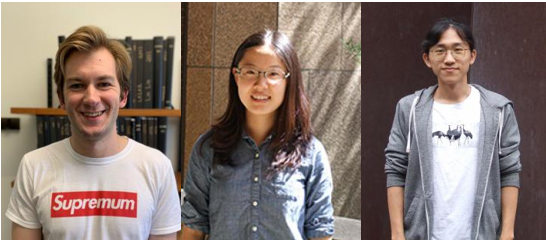-
Princeton University
-
PACM graduate students will speak about their research in Applied and Computational Mathematics.

Graeme Baker Shuangping Li Pinchen Xie
*This event is in-person and open only to Princeton University ID holders*
Graeme Baker Year: G4
Particle Systems Interacting Through Hitting Times: Non-Monotonic Case
Abstract: We show existence of physical solutions to a two-phase mean-field particle system in one-dimension with singular interaction through hitting times. The governing equations for this system arise as the probabilistic reformulation of a two-phase Stefan problem which describes the evolution of the boundary between a supercooled liquid and a superheated solid. The solutions are obtained as a large system limit in the Skorokhod M1 topology of a finite particle system approximation. Discontinuities in the interaction term are shown to satisfy a certain physical condition, and unlike for the previously studied one-phase mean-field particle systems with interaction via hitting times, the interaction term in this work is not necessarily monotonic, requiring novel arguments to prove existence.
Shuangping Li Year: G5
Mean Field Behavior during the Big Bang for Coalescing Random Walk
Abstract: Coalescing random walk is a classical interacting particle system in which particles placed at all sites of a graph perform continuous time random walk and coalesce upon colliding. It is also closely related to the voter model via duality. We consider the expected density P_t of coalescing random walk particles, on a variety of transient-like graphs, including configuration models and vertex transitive graphs. We show that P_t decays in the order of t^{-1}; and moreover, we show that t*P_t is approximately the probability two random walks avoid one another on the associated infinite graphs, and this approximation holds for all times in as large of an interval (the big bang period) as one could ever hope.
Pinchen Xie Year: G4
Ab initio multiscale modelling of ferroelectrics at equilibrium
Abstract: I’ll report the ab initio, non-perturbative, multi-scale modeling of ferroelectrics at thermal equilibrium. The approach is based on Deep Potential, a family of machine learning-based atomistic models, trained on first-principles data. The single-domain pure
PbTiO3 will be studied numerically as an example of constructing homogeneous coarse-grained model from the density functional theory.
